- Home
- Tim Tingle
NO-NAME
NO-NAME Read online
NO NAME
Tim Tingle
7th Generation
Summertown, Tennessee
© 2014 Tim Tingle
Cover and interior design: Deirdre Nemmers
All rights reserved. No portion of this book may be reproduced by any means whatsoever, except for brief quotations in reviews, without written permission from the publisher.
7th Generation, an imprint of
Book Publishing Company
PO Box 99, Summertown, TN 38483 888-260-8458
bookpubco.com
nativevoicesbooks.com
ISBN: 978-1-939053-06-0
19 18 17 16 15 14 1 2 3 4 5 6 7 8 9
Printed in the United States
Library of Congress Cataloging-in-Publication Data
Tingle, Tim.
No Name / Tim Tingle.
pages cm
ISBN 978-1-939053-06-0 (pbk.) -- ISBN 978-1-939053-93-0 (e-book)
[1. Fathers and sons--Fiction. 2. Child abuse--Fiction. 3. Alcoholism--Fiction. 4. Friendship--Fiction. 5. Basketball--Fiction. 6. Choctaw Indians--Fiction. 7. Cherokee Indians--Fiction. 8. Indians of North America--Oklahoma--Fiction. 9. Oklahoma--Fiction.] I. Title.
PZ7.T489No 2014
[Fic]--dc23
Book Publishing Company is a member of Green Press Initiative. We chose to print this title on paper with 100% postconsumer recycled content, processed without chlorine, which saved the following natural resources:
• 24 trees
• 751 pounds of solid waste
• 11,218 gallons of water
• 2,068 pounds of greenhouse gases
• 11 million BTU of energy
For more information on Green Press Initiative, visit www.greenpressinitiative.org. Environmental impact estimates were made using the Environmental Defense Fund Paper Calculator. For more information visit www.papercalculator.org.
Contents
Chapter 1: Under the Door and Before
Chapter 2: Orange Juice on the Floor
Chapter 3: Run!
Chapter 4: My New Digs
Chapter 5: Living in a Hole
Chapter 6: Backyard Submarine
Chapter 7: My Horror Movie
Chapter 8: The Boy with No Name
Chapter 9: How Bad Can It Get?
Chapter 10: Worse than You Think
Chapter 11: It Can Hurt to Listen
Chapter 12: Finally, Basketball!
Chapter 13: Clean, Hard Play
Chapter 14: Peace Offering or Trap?
Chapter 15: Johnny’s Dad
Chapter 16: Mystery Lady Faye
Chapter 17: Crying over Spilled Juice
Chapter 18: My Turn to Be Dad
Chapter 19: Got It Bad, My Man
Chapter 20: Baptism by Car
Chapter 21: Is This a Dream?
About the Author
To my family of survivors: Mom Margaret; Dad Archie; the Tingle boys, Danny, Ricky, and Bruce; and most especially to my big sister, Bobbie Jeanne
Chapter 1
Under the Door and Before
Friday night, June 8
I am living under a door in my backyard.
I dug a deep hole behind a fat-trunked tree and dragged a junkyard door over the hole. I glued leaves and grass to one side, so no one can see it’s a door.
There are no hinges. If anyone raked the leaves in the backyard (my chore for the past ten years), they would discover the door. The metal fingers of the rake would scrape scratches in the blue paint of the door.
And I would get in big trouble.
But I’m not worried. That will never happen. If anyone tried to rake the leaves, my father would grab the rake from them.
“Oh no, no you don’t!” he’d holler, and the red veins of his neck would swell. “That’s exactly what the boy wants! Somebody else doing his chores.”
That would bother him more than my being gone for a week. But don’t feel sorry for me. “That’s exactly what he wants!” my dad would yell. And yes, the red veins of his neck would swell.
So I am living under a door to get away from my dad—Buck Byington, as his friends know him. I know nobody is looking for me. My dad has not reported me as a missing person to the police.
I heard him talking to his buddy Guy about me yesterday. Dad was sitting on the back porch and yelling into his phone.
“Mind your own business, Guy. I’m not telling anybody Bobby’s missing. That’s what he wants, for the cops and everybody in town to be looking for him. Somebody will call his mother and she’ll get all upset and fly home. She’s on vacation, Guy! She needs time away from that little punk.”
Hoke. That’s enough about where I am now. You need to know how I got here. (And before we get started, you should know that hoke means “okay” in the Choctaw language. I’m Choctaw, and I use hoke a lot. Hoke?)
Here goes:
Saturday morning, May 12, 2014 (almost a month ago)
“You need a ride to the airport?” Dad asked.
My mother was taking her first vacation from work in years. She had stayed up late last night washing clothes and packing. Dad went to bed early, after the ten o’clock news.
Something was happening, something more than a vacation. I’m sixteen years old and I’m not stupid. I’d learned a long time ago to pay very close attention to anything Mom and Dad said. “You need a ride?” Dad asked again.
Mom was carrying her heavy suitcase to the door. She put it down and stared at his back. He didn’t even turn around. Finally, she hung her head and said, “No. Margie is giving me a ride.”
“Umm,” Dad said. When he didn’t care either way, that’s all he said. “Umm.”
I dragged her suitcase out the door while Mom stood by the cottonwood tree that shaded the front porch. Margie was a friend of hers from work. In less than ten minutes, she pulled her red Buick into the driveway and Mom waved at her.
“Will you load my things in the car?” Mom asked me, then she stepped back in the house. I watched her lean over the sofa and kiss my dad.
“Umm,” he said. That was his good-bye to her.
We loaded her bags into the trunk while Margie stayed in the car. Mom closed the trunk and stood with her back to me for the longest time.
I waited. When Mom turned to me, she had tears in her eyes. I wrapped my arms around myself. I hated to look at grown-ups crying, especially my mom.
“You be very careful, Bobby,” she said.
“I will,” I told her. “When are you coming home?”
“As soon as I can. I will miss you most of all. Do you know that?”
“I’ll miss you, too,” I said.
She kissed me on the cheek. “I’ll call you at home early Saturday mornings,” she said. “Before your father gets up.”
“Hoke,” I said. That was the last thing I said to my mom. “Hoke.” Maybe that was better than “Umm.” I hope so.
Margie backed out of the driveway. I stood in the yard and waved at Mom. When she was gone, I got my basketball from the garage. Dribbling all the way, I walked two blocks to the basketball court at the park.
I dribbled with my left hand, just like Kevin Durant. He was right-handed, like me, but he could go right or left, either way. He was impossible to guard.
Someday I’ll shoot three-pointers like Durant, I said to myself.
Chapter 2
Orange Juice on the Floor
It barely rained all summer, so the leaves were already falling. I broke a branch from a scraggly oak and swept the basketball court clean. I hated dribbling a dusty basketball. Nobody was at the park, just some kids playing on the merry-go-round.
I always started with free throws. I dribbled twice, stared hard at the rim, and shot the ball. “Always follow through!” I heard Coach Sc
ott holler in my mind. He was my gym coach in junior high.
I made six out of ten free throws. I was better than that. But I missed Mom.
So what happens now? I kept asking myself. Who’ll do the shopping? Who cooks supper? Who washes the clothes?
“You lazy little punk! Who do you think will wash your dirty clothes?” That voice was also in my mind. It was my dad, yelling at me.
I stayed all day at the park. My friends from school showed up and we played half-court games—make it, take it. Whoever made ten baskets first was the winner. I was a good shooter from the corner and my team usually won. If somebody came out to guard me, I dribbled around him to the basket.
“High five,” Johnny said after every basket, and we slapped palms. Johnny Mackey was a Cherokee and he was my best friend. He was also a great basketball player. He was tall and skinny, and when I missed a shot, he was always there to rebound and put it back in.
By early afternoon we were tired and sweaty.
“You want to come over for some sandwiches?” I asked Johnny. I’d been to his house a few times, but he’d never been to mine. We were friends from school.
“Sure,” Johnny said. “You live close?”
“Two blocks thataway,” I said, pointing to my street.
We dribbled and passed the ball back and forth on the way home. When we reached my house, I rolled the ball in the garage and closed the door.
“Let’s go around back,” I said.
Less chance of seeing Dad that way, I thought. But no luck. We stepped through the back door and Dad was sitting at the kitchen table.
“You think you’re getting out of work now that your mother is gone?” he said. He took a long drink and slammed his can to the table. “I’m talking to you, boy!”
“I can work now,” I said. “I went down to the park. This is my friend, Johnny.”
“I know who he is,” said Dad. “I know his old man. He thinks he’s better than we are.”
Johnny nodded to me and backed out the door. No sandwiches today.
“We are Choctaw, boy!” Dad yelled, loud enough for Johnny to hear.
I was ashamed about my dad, but I knew Johnny would be hoke. We were teammates. Nobody could dribble and shoot like me, and nobody could play defense and rebound like Johnny. Besides, everybody knew how my dad was. He always hollered when he drank.
And that made-up fight between Cherokees and Choctaws, that was for grown-ups to worry about. We had better things to do than fight old wars.
“I’ll rake the leaves,” I said, stepping out the back door.
“We got weeds in the flower beds taller than the house!” Dad said.
I didn’t say anything, but I knew what I’d be doing till dark. No lunch today. I got me a drink from the water faucet and went to work.
Dad must have been “running on empty,” as he liked to say. In an hour I heard him drive to the corner store, the mufflers on his pickup popping like shotguns.
I ran to the kitchen and made me a bologna sandwich, with mayo and dill pickles. My Choctaw family had a thing about dill pickles. They were hoke, as my grandma used to say.
I leaned against the house and ate my sandwich. I had a spot where the gardenias grew thick and Dad couldn’t see me. I know, my dad wasn’t even around.
But what if a Cherokee warrior shot out his tires with a bow and arrow and Dad came home to get a Choctaw cannon and blow every Cherokee off the map?
Hoke, that’s not gonna happen. But you can’t be too careful. Not with my dad.
I raked leaves in the backyard till well after dark. I pulled weeds till my fingers blistered and a bunch of fire ants crawled all over me. They were smart fire ants. They all stung me at the same time.
Legs, back, neck, ears.
“Yow!” I screamed. Dad was home now, watching TV and sipping his brew.
“If you ain’t been bit by a rattlesnake, then shut up!” he hollered. I waited for the funny part of the joke. “And if it is a rattlesnake, you’re dead anyway. So shut up till the undertaker comes.”
I pulled my shirt off and brushed the ants away. I hung my pants over a bush and ran to the water faucet. I hosed myself down good.
“You hungry for some supper?” Dad asked through the open window.
“Yes, that’d be great.”
“Good,” he said. “I’m hungry, too. I bought a big can of chili and some cheese and onions. Your turn to cook.”
I dashed through the kitchen, carrying my pants. Ten minutes later, dried off and decent, I cooked supper for us both. I sat at the table and ate while Dad watched TV. He fell asleep on the sofa that night. That was never a good thing. He always woke up mad.
The next morning I was sitting at the table, drinking orange juice and eating a bowl of crunchy chocolate cereal. He snuck up behind me.
“You know why I stayed up so late, you little punk?” he said.
I just looked at him. I had learned not to talk to Dad in the mornings. But this morning, the first morning without my mom, it didn’t matter.
“You know why I stayed up late?” he asked me again. He gave me a mean look and walked away from the table. I thought I was safe, but I was wrong.
I lifted my orange juice glass and took a drink. At that moment, Dad grabbed the back of my chair and flung it to the floor. I hit my head hard. The glass shattered and orange juice flew all over the kitchen.
Chapter 3
Run!
I rolled to my feet and headed for the door, but the floor was slick. My legs flew out from under me. I fell face-first and my wrist landed on a sharp piece of glass. Blood flowed from my arm, making a wet puddle of blood and orange juice.
Dad grabbed me by the collar and lifted me. He drew back his arm to hit me, but he stepped in the puddle. He stumbled and waved his arms before he lost it. Dad fell backward and landed on the floor. He made a horrible face and the breath left him in a loud whoof!
Dad sat up slowly. He reached over his left shoulder and pulled out a piece of glass as big as a dollar bill. Blood gushed from the cut.
He looked at his hand holding the glass while the blood flowed down his arm. Then he tilted his head like he didn’t know what was happening. I couldn’t believe what I was seeing.
“Are you hoke?” I heard myself asking. He might be the biggest bully in town, but he was still my dad.
The look he gave me was unlike anything I had ever seen. It was like he realized, for the first time, what it meant to be my dad.
But that lasted only for a moment. Soon everything was back to normal.
Dad shook his fist at me. He called out, “I will get you for this, you worthless piece of dung!”
I ran from the kitchen, slamming the door behind me. Dad was mad now, really mad. My only hope was to run fast and far away. Not to the park. He’d look for me there.
Not to Johnny’s. Dad was so mad he might come banging on Johnny’s front door. But this wasn’t the first time Dad really lost it. This wasn’t the first time the veins in his neck swelled bright red.
I knew where to go.
The railroad tracks. They snaked through the woods a half mile away. There was no road to the tracks, not even a dirt road. And if Dad was crazy enough to drive his truck across the grassy field, he didn’t know where the sinkholes were.
I could get away. Maybe.
I cut through backyards and hopped over a fence. Tall pine trees waved in the breeze. The woods looked friendly, and I needed friends—even if they were only trees. I hunched over and ran through the tall grass.
I was almost to the woods when it happened.
I had no warning. The grass grew so tall I never saw the hole. My foot sunk in the mud and I fell. My ankle twisted and I felt a painful “pop.”
I landed on my back. My head hit the soft grass and I lay there, looking at the clouds floating overhead. I had been running scared for half an hour and I was breathing hard. My dad had thrown my chair to the floor and my world would never be the same.
Johnny had sprained his ankle once, so I knew what to expect. Several weeks of limping and wincing with every step. Not good. No running, no getting away.
“Now you’re gonna get the whippin’ you deserve!” I could hear my dad say. How many times had I heard this before?
“The whippin’ I deserved” was always the worst kind. And it had nothing to do with what I had done. It had more to do with how much my dad had to drink.
I lifted myself just enough to look across the field. Dad can’t see me now, I thought. I’m safe for a while at least.
I slid back into the hole and laughed, not a happy laugh but a sad, stupid little laugh—the laugh you do when you feel really sorry for yourself.
“Yeah,” I said out loud. “I’m real safe. I’m in the bottom of a sinkhole by the railroad tracks. My arm is cut and bleeding. My ankle is sprained, maybe broken. My mom is gone for nobody knows how long. I have maybe seventy-five cents in my pocket. My dad just pulled a piece of glass from his shoulder. He blames me for it, and he wants to give me ‘the whipping I deserve.’”
There’s no way out of this. That was my first thought. But I have spent my whole life figuring out ways to get out, get away, get anywhere else but where I was.
I’d also learned that sometimes the answer is right in front of you. This was one of those times. I was lying in a hole and nobody could see me. If I waited till dark, I could crawl out and get something to eat. My ankle maybe wouldn’t hurt so bad.
If somebody walked by, they might see me. So I needed to cover up the hole. But what if Mom comes back? What if a snake slides down the sinkhole?
Hoke. So a hole was a good idea, a hole where Dad couldn’t find me, but I needed a hole closer to home. I lifted myself again and looked to the houses. I couldn’t see mine, of course, but I pictured our house in my mind.
The grass was overgrown in our backyard. That was my next chore. The leaves needed raking. I laughed for real this time. I had a plan, a crazy plan, but one that would work! I laughed so loud and long that I stomped my feet.

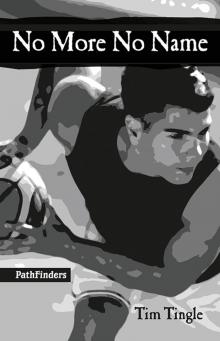 No More No Name
No More No Name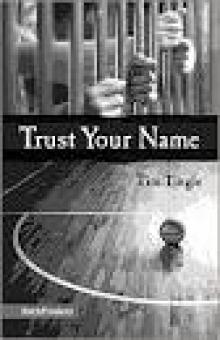 Trust Your Name
Trust Your Name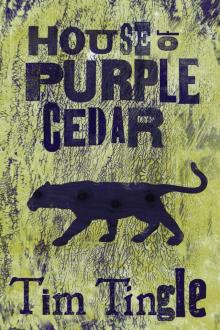 House of Purple Cedar
House of Purple Cedar NO-NAME
NO-NAME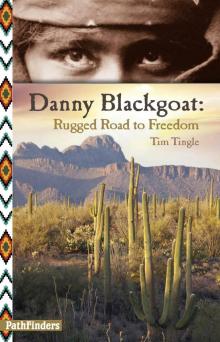 Danny Blackgoat: Rugged Road to Freedom
Danny Blackgoat: Rugged Road to Freedom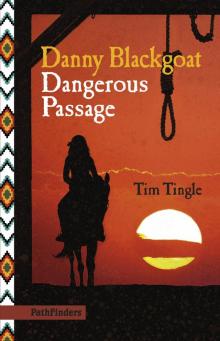 Danny Blackgoat
Danny Blackgoat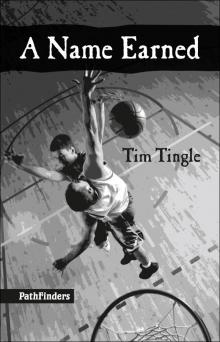 A Name Earned
A Name Earned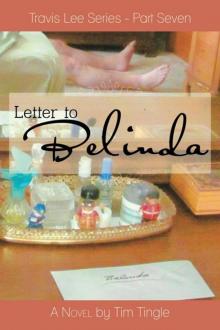 Letter to Belinda
Letter to Belinda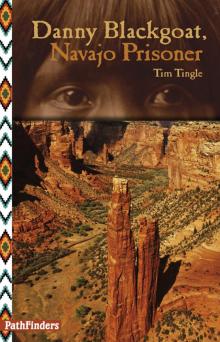 Danny Blackgoat, Navajo Prisoner
Danny Blackgoat, Navajo Prisoner